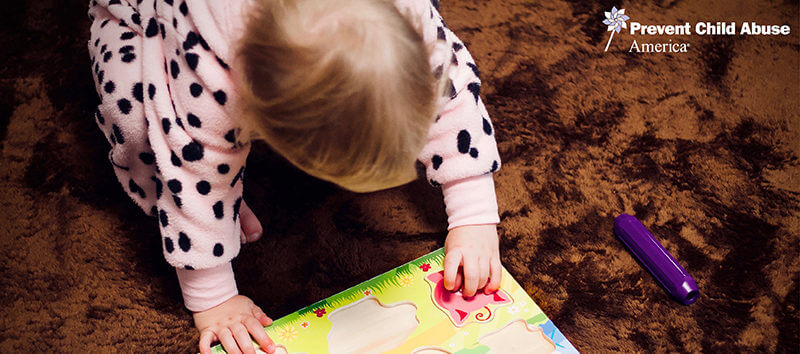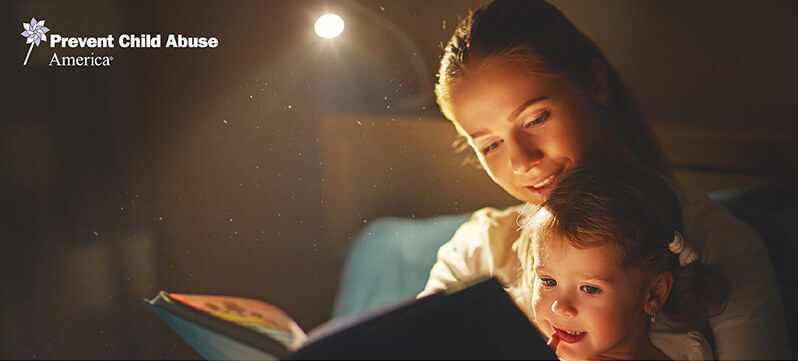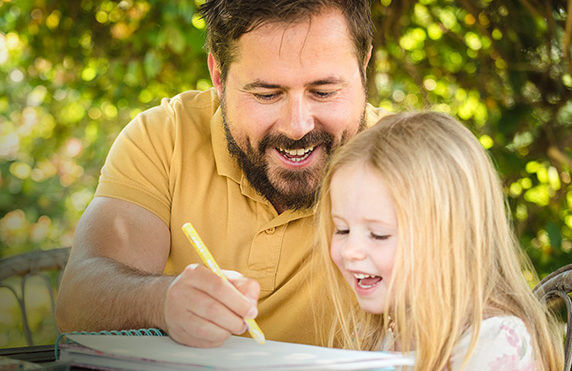The first three years of life are critical to a child’s development. From the first crawl to first steps to first words, understanding developmental milestones is a big part of being a parent. But what about brain development? Did you know that little interactions, like blowing raspberries on a baby’s stomach, can actually help build the foundation of your child’s brain? This Parenting Tip is about how you can support your child’s growing brain and set your child up for a lifetime of success.

Understanding Brain Development
Specific actions, sometimes called “serve and return interactions,” can build a positive relationship with your child and form the foundation for your child’s developing brain. Examples of serve-and-return interactions include making eye contact with your baby when changing their diaper or talking back to your baby when they coo at you. These simple actions help map pathways in your child’s brain, setting up a strong foundation for all future development.
Another kind of experience that affects a child’s developing brain is stress. Some kinds of stress, such as studying for a test, are good for brain development because they teach children how to deal with challenges in the future. But when a child is exposed to continuous stress – such as abuse and neglect, or other Adverse Childhood Experiences – they can experience what is called toxic stress, which can undermine the brain’s foundation and can lead to negative outcomes in the future, such as increased risk for disease or poverty.
Rather than deal with the negative effects of toxic stress and ACEs in the future, by focusing on healthy child development early, parents and adults can set children up for a lifetime of success.
Learn more about brain development with this short video from the Alberta Wellness Center.
How Can I Help?
Children can’t build their brains on their own. They need positive experiences to nurture their development. Healthy and positive relationships between child and parent are critical to creating these positive experiences.
As a parent, spending quality time with your child is key to their development. Some examples of interactions that help support your child’s brain development during the first three years include:
- Talk to your child during playtime. Children learn through play! Help make playtime a better environment for children by talking to them during playtime. For example, if you hand your infant or toddler a ball, ask them what color it is, or ask them to describe what they’re doing. Responding back and forth to your child is a key to developing your child’s growing brain.
- Ask your child open-ended questions. Questions beginning with “What do you think would happen…” or “I wonder why…” can act as prompts to get your child thinking about relationships between objects, people, and the world around them. Even if your child doesn’t answer, questions like these can help build the curiosity that leads to deeper learning.
- When kids experience emotions, label and discuss them. Young children, especially during times of stress, need help to manage their emotions, also known as regulation. You can help your child regulate by teaching them to understand their feelings. Talk to your children about the differences between emotions like sadness and anger and help them calm down. Knowing how to appropriately diagnose their feelings will help children deal with them appropriately in the future.
How is Brain Development Related to Child Abuse and Neglect?
We know that negative experiences like child abuse and neglect cause toxic stress that can fundamentally alter a child’s developing brain and can break down the foundation that supports future development. But we also know that the effects of toxic stress can be buffered by the presence of a stable, caring adult.
According to the Harvard Center on the Developing Child, the more of these stable adults in a child’s life, the more resilient, or able to bounce back from negative experiences, they are. This is one reason why we talk so much about building social connections in your neighborhood or community. By having connections to multiple different trusted adults, children are more likely to find the stability their brains need to deal with toxic stress.
As a parent, you can help fill this role for other children, too. Be present in the life of other children – such as through group playdates, by volunteering to staff a school program, or being a mentor like a coach – and provide the example of a stable, caring adult. For more information on how you can help, read our Parenting Tip on the Protective Factors.
What else do you want to know about brain development? Let us know by tweeting us @PCAAmerica or by leaving a comment on our Facebook page!





